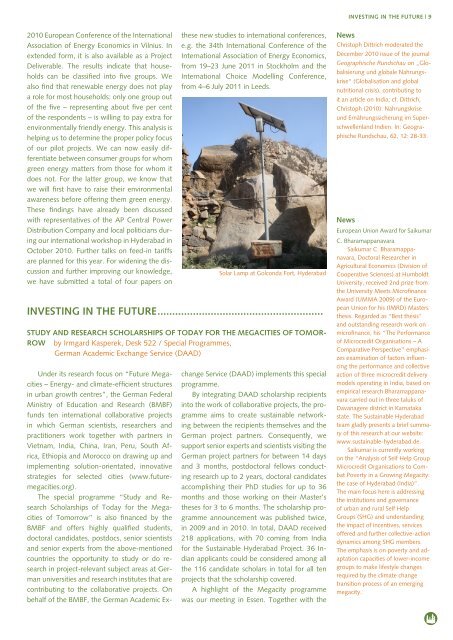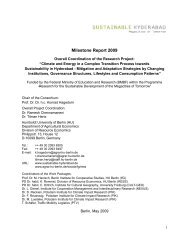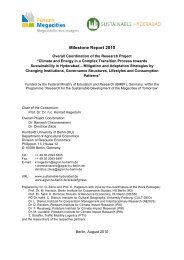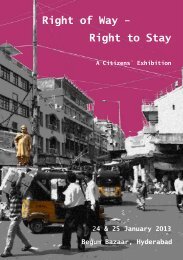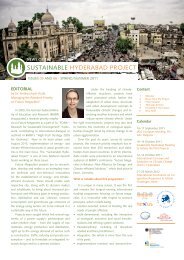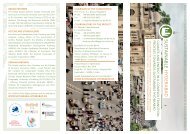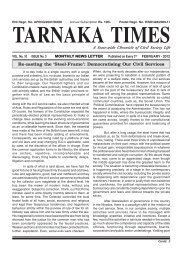SUSTAINABLE HYDERABAD PROJECT
SUSTAINABLE HYDERABAD PROJECT
SUSTAINABLE HYDERABAD PROJECT
Create successful ePaper yourself
Turn your PDF publications into a flip-book with our unique Google optimized e-Paper software.
INVESTING IN THE FUTURE | 9<br />
2010 European Conference of the International<br />
Association of Energy Economics in Vilnius. In<br />
extended form, it is also available as a Project<br />
Deliverable. The results indicate that households<br />
can be classified into five groups. We<br />
also find that renewable energy does not play<br />
a role for most households: only one group out<br />
of the five – representing about five per cent<br />
of the respondents – is willing to pay extra for<br />
environmentally friendly energy. This analysis is<br />
helping us to determine the proper policy focus<br />
of our pilot projects. We can now easily differentiate<br />
between consumer groups for whom<br />
green energy matters from those for whom it<br />
does not. For the latter group, we know that<br />
we will first have to raise their environmental<br />
awareness before offering them green energy.<br />
These findings have already been discussed<br />
with representatives of the AP Central Power<br />
Distribution Company and local politicians during<br />
our international workshop in Hyderabad in<br />
October 2010. Further talks on feed-in tariffs<br />
are planned for this year. For widening the discussion<br />
and further improving our knowledge,<br />
we have submitted a total of four papers on<br />
these new studies to international conferences,<br />
e.g. the 34th International Conference of the<br />
International Association of Energy Economics,<br />
from 19–23 June 2011 in Stockholm and the<br />
International Choice Modelling Conference,<br />
from 4–6 July 2011 in Leeds.<br />
Solar Lamp at Golconda Fort, Hyderabad<br />
INVESTING IN THE FUTURE.........................................................<br />
STUDY AND RESEARCH SCHOLARSHIPS OF TODAY FOR THE MEGACITIES OF TOMOR-<br />
ROW by Irmgard Kasperek, Desk 522 / Special Programmes,<br />
German Academic Exchange Service (DAAD)<br />
Under its research focus on “Future Megacities<br />
– Energy- and climate-efficient structures<br />
in urban growth centres”, the German Federal<br />
Ministry of Education and Research (BMBF)<br />
funds ten international collaborative projects<br />
in which German scientists, researchers and<br />
practitioners work together with partners in<br />
Vietnam, India, China, Iran, Peru, South Africa,<br />
Ethiopia and Morocco on drawing up and<br />
implementing solution-orientated, innovative<br />
strategies for selected cities (www.futuremegacities.org).<br />
The special programme “Study and Research<br />
Scholarships of Today for the Megacities<br />
of Tomorrow” is also financed by the<br />
BMBF and offers highly qualified students,<br />
doctoral candidates, postdocs, senior scientists<br />
and senior experts from the above-mentioned<br />
countries the opportunity to study or do research<br />
in project-relevant subject areas at German<br />
universities and research institutes that are<br />
contributing to the collaborative projects. On<br />
behalf of the BMBF, the German Academic Exchange<br />
Service (DAAD) implements this special<br />
programme.<br />
By integrating DAAD scholarship recipients<br />
into the work of collaborative projects, the programme<br />
aims to create sustainable networking<br />
between the recipients themselves and the<br />
German project partners. Consequently, we<br />
support senior experts and scientists visiting the<br />
German project partners for between 14 days<br />
and 3 months, postdoctoral fellows conducting<br />
research up to 2 years, doctoral candidates<br />
accomplishing their PhD studies for up to 36<br />
months and those working on their Master’s<br />
theses for 3 to 6 months. The scholarship programme<br />
announcement was published twice,<br />
in 2009 and in 2010. In total, DAAD received<br />
218 applications, with 70 coming from India<br />
for the Sustainable Hyderabad Project. 36 Indian<br />
applicants could be considered among all<br />
the 116 candidate scholars in total for all ten<br />
projects that the scholarship covered.<br />
A highlight of the Megacity programme<br />
was our meeting in Essen. Together with the<br />
News<br />
Christoph Dittrich moderated the<br />
December 2010 issue of the journal<br />
Geographische Rundschau on „Globalisierung<br />
und globale Nahrungskrise“<br />
(Globalisation and global<br />
nutritional crisis), contributing to<br />
it an article on India; cf. Dittrich,<br />
Christoph (2010): Nahrungskrise<br />
und Ernährungssicherung im Superschwellenland<br />
Indien. In: Geographische<br />
Rundschau, 62, 12: 28-33.<br />
News<br />
European Union Award for Saikumar<br />
C. Bharamappanavara<br />
Saikumar C. Bharamappanavara,<br />
Doctoral Researcher in<br />
Agricultural Economics (Division of<br />
Cooperative Sciences) at Humboldt<br />
University, received 2nd prize from<br />
the University Meets Microfinance<br />
Award (UMMA 2009) of the European<br />
Union for his (IMRD) Masters<br />
thesis. Regarded as “Best thesis”<br />
and outstanding research work on<br />
microfinance, his “The Performance<br />
of Microcredit Organisations – A<br />
Comparative Perspective” emphasizes<br />
examination of factors influencing<br />
the performance and collective<br />
action of three microcredit delivery<br />
models operating in India, based on<br />
empirical research Bharamappanavara<br />
carried out in three taluks of<br />
Davanagere district in Karnataka<br />
state. The Sustainable Hyderabad<br />
team gladly presents a brief summary<br />
of this research at our website:<br />
www.sustainable-hyderabad.de.<br />
Saikumar is currently working<br />
on the “Analysis of Self Help Group<br />
Microcredit Organisations to Combat<br />
Poverty in a Growing Megacity:<br />
the case of Hyderabad (India)”.<br />
The main focus here is addressing<br />
the institutions and governance<br />
of urban and rural Self Help<br />
Groups (SHG) and understanding<br />
the impact of incentives, services<br />
offered and further collective-action<br />
dynamics among SHG members.<br />
The emphasis is on poverty and adaptation<br />
capacities of lower-income<br />
groups to make lifestyle changes<br />
required by the climate change<br />
transition process of an emerging<br />
megacity.


